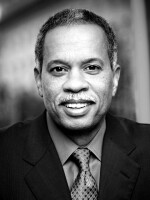STEVE INSKEEP, host:
It's MORNING EDITION from NPR News. Good morning. I'm Steve Inskeep.
RENEE MONTAGNE, host:
And I'm Renee Montagne.
Both presidential candidates won their nominations by promising something different. In a word: change. And we'll hear more about that word in a moment. We begin with something that hasn't changed.
Both John McCain and Barack Obama depend on veteran Washington insiders, and one of those insiders has just been forced to resign. He was the man leading Barack Obama's vice presidential selection team. Joining us now for some analysis is NPR's Juan Williams. Good morning, Juan.
JUAN WILLIAMS: Good morning, Renee.
MONTAGNE: So Jim Johnson came under scrutiny over his personal and professional financial dealings almost as soon as his name was announced. You know, why did he end up resigning?
WILLIAMS: Well, he'd become a distraction to the Obama campaign, just as the campaign was trying to get in gear for the general election. Senator Obama is trying to raise the question of how the Republicans have dealt with the economy and to focus on that issue and the idea of reform.
Jim Johnson had received several favorable rates on loans for houses from Countrywide Financial, which is now the target of federal scrutiny in the subprime mortgage crisis. He also served on the boards of several companies that have given lavish pay packages to executives.
So, technically, Jim Johnson has done nothing illegal, Renee, but his mere presence gave the McCain campaign the opportunity to say that Senator Obama was close to the kind of insiders and special interest groups that he often charges are part of the McCain campaign with the Republicans, and that he's trying to push out of Washington.
So, all of the sudden, charges of hypocrisy were everywhere in the air.
MONTAGNE: And it makes you wonder why Obama selected Jim Johnson in the first place.
WILLIAMS: Well, you know, Jim Johnson is a guy who is seen as the quintessential Washington insider. He had served as a Senate staffer to Walter Mondale back and then chief of staff when Mondale became vice president. He's the past head of Fannie Mae, the Kennedy Center, the Brookings Institution. As I say, a real player in Democratic Party politics.
And he was a man also, I might say, in charge of vetting vice presidential candidates for Walter Mondale in '84 and John Kerry in '04. So he had experience in exactly this line of business that Obama was concerned with, finding the right vice presidential nominee.
MONTAGNE: Of course, we've heard a lot about the McCain campaign having lots of lobbyists and insiders in charge of its various political activities, including its vice presidential selection team.
WILLIAMS: Well, that's right. Arthur Culverhouse, Renee. And at the top of the McCain campaign, you have people like Rick Davis and Charlie Black. All of them have ties to major lobbying operations. In fact, a few weeks ago, one of McCain's top aides had to resign because he had lobbied for Burma/Myanmar and the junta there. And there's pressure already on the McCain team to push out people like the Charlie Black and Rick Davis because of their past lobbying connections.
So, what happened here was that Johnson raising his profile and his lavish lifestyle in Washington gave the McCain camp an opportunity to say, hey, wait a second. You're pointing fingers when you're guilty of the same sin.
MONTAGNE: Juan, thanks very much.
WILLIAMS: You're welcome, Renee.
MONTAGNE: NPR's Juan Williams. Transcript provided by NPR, Copyright NPR.







